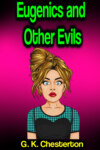
Volume 170 pages
Eugenics and Other Evils
About the book
Eugenics and Other Evils – G. K. Chesterton – When the concept of eugenics – the practice of selecting for desirable traits in the larger population by encouraging gifted and/or attractive people to breed – began to take hold in the early twentieth century, British thinker and writer G.K. Chesterton took a stance contrary to that of many intellectuals of the period and denounced it as evil in this bold, engaging series of essays.
Gilbert Keith Chesterton (29 May 1874 – 14 June 1936) was an English writer, philosopher, lay theologian, and literary and art critic. He has been referred to as the «prince of paradox». Time magazine observed of his writing style: «Whenever possible Chesterton made his points with popular sayings, proverbs, allegories—first carefully turning them inside out.»
Chesterton created the fictional priest-detective Father Brown, and wrote on apologetics. Even some of those who disagree with him have recognised the wide appeal of such works as Orthodoxy and The Everlasting Man. Chesterton routinely referred to himself as an «orthodox» Christian, and came to identify this position more and more with Catholicism, eventually converting to Roman Catholicism from high church Anglicanism. Biographers have identified him as a successor to such Victorian authors as Matthew Arnold, Thomas Carlyle, John Henry Newman and John Ruskin.
Chesterton was born in Campden Hill in Kensington, London, the son of Marie Louise, née Grosjean, and Edward Chesterton (1841–1922). Chesterton was baptised at the age of one month into the Church of England, though his family themselves were irregularly practising Unitarians. According to his autobiography, as a young man he became fascinated with the occult and, along with his brother Cecil, experimented with Ouija boards. He was educated at St Paul's School, then attended the Slade School of Art to become an illustrator. The Slade is a department of University College London, where Chesterton also took classes in literature, but did not complete a degree in either subject. He married Frances Blogg in 1901; the marriage lasted the rest of his life. Chesterton credited Frances with leading him back to Anglicanism, though he later considered Anglicanism to be a «pale imitation». He entered full communion with the Roman Catholic Church in 1922. The couple were unable to have children.
Leave a review










